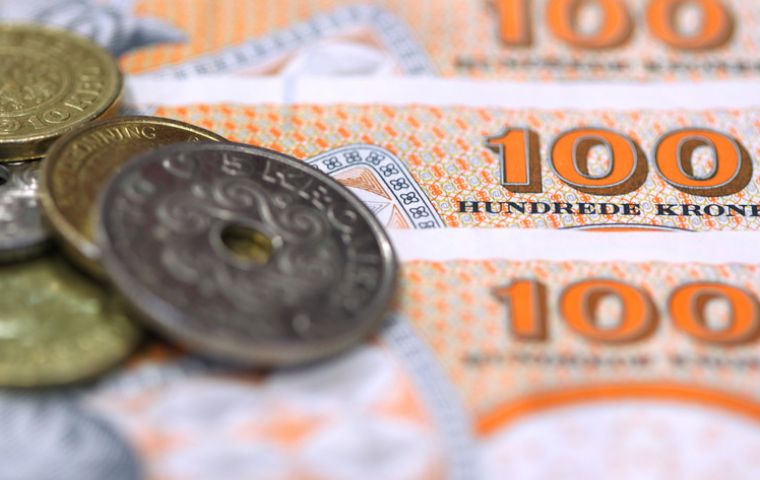MercoPress. South Atlantic News Agency
Denmark, following on Switzerland, forecasted to remove Krone's peg to the Euro
 Making the Krone less attractive Denmark cut its deposit rate to minus 0.2% from minus 0.05% and the lending rate was cut from 0.2% to 0.05%.
Making the Krone less attractive Denmark cut its deposit rate to minus 0.2% from minus 0.05% and the lending rate was cut from 0.2% to 0.05%.  This week the European Central Bank is expected to begin a stimulus program for the Euro-zone, which could put more upward pressure on the Krone.
This week the European Central Bank is expected to begin a stimulus program for the Euro-zone, which could put more upward pressure on the Krone. Denmark has cut its key interest rate to prevent the Krone from strengthening in the wake of Switzerland's decision to scrap the franc's peg to the Euro. There has been speculation that Denmark could follow the Swiss move by removing the Krone's link to the Euro.
Denmark cut its deposit rate to minus 0.2% from minus 0.05%. The lending rate was cut from 0.2% to 0.05%. It makes the Krone less attractive to investors, and eases pressure on the central bank to keep buying Euros.
Denmark pegs its currency to the Euro to help the country's exporters and maintain stable inflation. But the country's central bank has been forced to intervene to defend the peg as the Krone appreciated.
With its top-tier credit rating of AAA, Denmark was seen as a safe place to keep money during the financial and economic crisis.
Denmark first imposed negative rates in 2012, meaning that depositors effectively had to pay to keep their money with the central bank. Monday's rate cut means depositors will pay even more.
The move comes ahead of a possible move this week by the European Central Bank (ECB) to begin an economic stimulus program for the Euro zone, which could put yet more upward pressure on the Krone.
If the ECB embarks on a large-scale bond-buying program, it will increase the supply of Euros across the Euro zone. That is likely to further depreciate the Euro's value against the Krone.
“The central bank wanted to cut today and not wait until after the ECB - obviously they're afraid that the upward pressure on the crown would intensify over the next few days,” said Niels Christensen, foreign exchange strategist at Nordea, in Copenhagen.
”I'm sure (the central bank) will continue to intervene if the downward pressure in Europe continues,” he said.




Top Comments
Disclaimer & comment rulesCommenting for this story is now closed.
If you have a Facebook account, become a fan and comment on our Facebook Page!